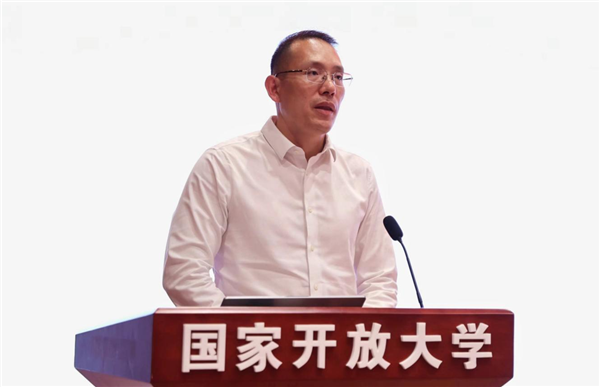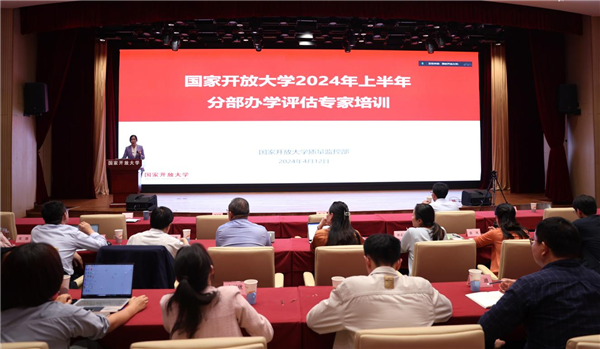 On 12 April 2024, the Open University of China (OUC) and the Education Quality Evaluation Agency of the Ministry of Education (MOE) jointly organised expert training and launched an evaluation of the operation of their branches for the first half of 2024.
On 12 April 2024, the Open University of China (OUC) and the Education Quality Evaluation Agency of the Ministry of Education (MOE) jointly organised expert training and launched an evaluation of the operation of their branches for the first half of 2024.
Fifty-six experts and observers, along with assessment secretaries from both regular universities and the open university system, participated in the training, which was held both online and offline. Li Song, a member of the Party Committee and vice president of the OUC, attended the meeting and delivered a speech. Jin Yan, deputy director of the Department of Quality Monitoring and Control, chaired the meeting.

Li Song expressed gratitude to the experts involved in the evaluation and highlighted that OUC has collaborated with the MOE's Education Quality Evaluation Agency to develop the evaluation system for the operation of OUC branches. He emphasised that this is a crucial step in implementing "The Overall Plan for Deepening the Reform of Educational Evaluation in the New Era" and "The OUC Comprehensive Reform Plan." Practice has shown that the evaluation of branch operations has significantly enhanced the standardisation, guarantee level, teaching quality, and social reputation of the OUC system's education, effectively promoting the development of an integrated educational pattern. He stressed that this year marks the conclusion of the first round of evaluation. The first priority of this evaluation is to assess ideological understanding. Only with a correct understanding of evaluation can it be effectively applied to achieve tangible outcomes, thus facilitating improvement, development, and growth through evaluation. The second priority is to consider the comprehensive picture in all aspects. It is crucial to further refine the positioning, understanding it well within the context of the entire educational ecosystem and the broader scope of education. The third is to focus on distinctive features, tailoring evaluations to the unique characteristics of the branches while considering unified standards and the overall situation. The fourth is to consider long-term sustainability. He hopes that the experts can assist the branches not only in recognising the real situations and addressing prominent contradictions during the evaluation process but also in prioritizing long-term development and establishing a sustainable mechanism.
Ran Shuyang, former dean of the Adult Continuing Education College at Sichuan University, comprehensively clarified the evaluation process under the theme " Fostering Development Through Evaluation to Promote High-Quality Development of Open Education." Speaking as a recommended expert from the MOE's Education Quality Evaluation Agency, he addressed five key areas: the context of the times, the format and process, evaluation criteria, precautions, and work discipline. He also offered practical and relevant suggestions for the work.

Li Xinhui, deputy director of the Discipline Inspection Office (also known as the Audit Office) at OUC, highlighted specific expectations in three areas: political discipline, work discipline, and integrity discipline, referencing relevant documents and systems. Zhang Huiguang, deputy chief of the Financial Accounting Section in the Finance Department, presented the pertinent financial requirements for the evaluation period. Zhao Jia, deputy director of the Department of Quality Monitoring and Control, explained the evaluation indicators.
The expert panel will conduct the evaluation work in the first half of 2024 in an orderly manner, adhering to the training requirements. They will collaborate to advance the high-quality development of the OUC education system. The panel will effectively address "A Leading Country in Education: The Role of Open Education," a timely proposition, by achieving practical outcomes in their evaluation.
Written by Wang Jia and photos by Zhang Jun, OUC